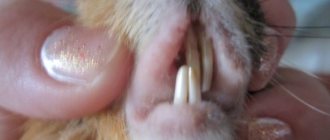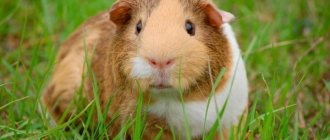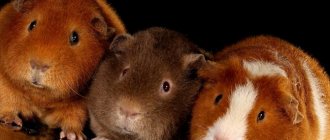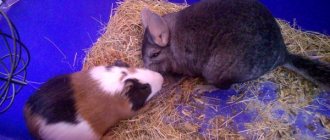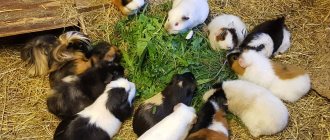A healthy animal has an appropriate appetite. It is active and constantly wants to chew something. Feeding occurs 2-3 times a day. When people lose their appetite, they do not immediately pay attention to this, and it is in vain. If your guinea pig doesn't eat or drink, this is the first sign that something is wrong with it. Moreover, complete refusal of food can quickly result in death.
The pet's digestive system is designed in such a way that it cannot fast for more than one day. At the same time, irreversible changes occur in the intestines that will not allow the animal to recover from the disease. In Europe, euthanasia or a good death is often recommended. In other words, the animal is simply euthanized painlessly.
The dangers of not eating
If a guinea pig stops eating, the function and intestinal microflora are disrupted. Inflammation and severe diarrhea begin, which leads to death. A complete refusal to eat leads to intestinal cessation, the stomach swells and the pet dies.
With a prolonged absence of food, the nerve endings of the digestive organs are disrupted and even die. In this state, the movement of food stops, since these are the nerves that give the signal for the contraction of the stomach. In the absence of food, the point of no return occurs after 16 hours.
Reasons for refusing food
The most common reasons why your guinea pig is not eating well and losing weight are:
- Violation of the function of grinding teeth, as a result of which they grow too long.
- Diseases of the digestive system.
- Poor quality or unwashed food.
- Refusal to eat can be a consequence of serious illness.
- Oral problems.
- Hot climate.
- Internal and external parasites.
If your guinea pig stops eating, contact a qualified professional immediately. A rodentologist can determine the cause.
Why doesn't my guinea pig want to eat?
There are many reasons why a guinea pig refuses food. This may be a consequence of illness or a response to improper living conditions. However, knowing exactly the sources of eating disorders, you can quickly take measures to eliminate them.
Bad food
There are foods that are strictly contraindicated in the diet of guinea pigs. This is caused by maladjustment of the digestive system and further health problems.
Find out also how much guinea pigs cost.
These include:
- dairy products - milk, yogurt, cheese, etc.;
- meat - in any form;
- sweets - chocolate, cookies, marmalade, etc.;
- nuts;
- potato;
- canned food;
- cereal or any instant breakfast cereal.
All these products cannot be digested well in the guinea pig's stomach and will lead to gastrointestinal problems.
Wrong content temperature
The optimal temperature regime for the room in which the guinea pig is kept is +18…+25°C. In case of deviation from the norm, the animal will react by decreasing or increasing its body temperature, which will negatively affect its overall health. The appearance of the coat will also change: at low temperatures it grows and becomes thicker, at high temperatures it becomes sparse and short.
Pay attention to the information about where the name “guinea pig” comes from.
Additionally, to avoid loss of appetite, you need to take into account other air parameters. These include humidity and the amount of oxygen - they can be regulated by frequent ventilation (the cage should not be in a draft), and during cold weather and heating - by throwing a damp towel over the radiators or turning on a humidifier.
Dental problems
The most common reason for rodents refusing food is dental problems. For example, insufficient grinding of the incisors, which is caused by the lack of a sufficient amount of rough and hard food in the guinea pig’s daily diet. As a result, teeth grow too long and sharp, which often leads to the inability to eat normally and injuries to the inner surface of the cheeks and gums.
Did you know? The Incas were the first to domesticate guinea pigs, although they were used as a source of meat. This happened 7 thousand years ago.
The way out of this situation is to go to the veterinarian. The procedure for filing the incisors is not painful for the animal and will not take much time for the pet owner, and tangible relief occurs almost immediately.
Another reason for forced hunger strike is malocclusion, which can be either congenital or acquired. In the first case, an infrequent but regular visit to the veterinary clinic will be required, where the rodent’s teeth will be systematically filed down and trimmed. If the bite is damaged as a result of injury or tooth breakage, correction will take only a few sessions, during which the guinea pig's teeth will be filed and a special supporting bandage will be put on.
Here you can read why guinea pigs squeak.
The following symptoms may indicate dental problems:
- refusal of solid food pellets;
- selection of animals from all the food offered only the smallest pieces;
- excessive salivation;
- weight loss in a short time;
- chewing food is carried out only on one side of the jaw;
- constant chewing movements (while the food in the feeder is practically not touched).
Since dental problems entail constant poor chewing of food, the result can be various gastrointestinal diseases with accompanying stool disorders (diarrhea, constipation). Therefore, if after grinding down the teeth the animal does not get better (appetite does not return, body weight does not gain), then you need to look for the cause in diseases of the stomach or intestines.
You may find information about the life of guinea pigs in the wild useful.
Diseases that make you not want to eat
Among the main diseases that can lead to a decrease or complete loss of appetite include:
- Colds are especially common in the autumn and spring. The first symptoms include general lethargy, refusal of food and water, rapid breathing, runny nose and cough. The average duration of such an illness is about 5 days, but without proper care and treatment it can lead to the death of the animal. Colds should be treated with sulfonamide drugs, for example, “Sulfazin” at a dosage of 0.1 g per 1 kg of weight, 3 times a day. It should be noted that taking the drug should continue even after the temperature drops, until complete recovery. For a runny nose, streptocide powder is used, which is blown into the pet’s nose, and an infusion of nettle leaves will help get rid of a cough. In this case, antibiotics are recommended to be given only in extreme cases and only in conjunction with probiotics.
- Infectious diseases have many variants, but perhaps the most common ailment is salmonellosis. It often occurs with symptoms of gastrointestinal tract damage - periodic diarrhea and loss of appetite. In particularly acute cases, it takes about 24 hours for the disease to develop, during which the animal dies.
- Constipation - defined by the absence of feces. If during the first 24 hours a guinea pig stops going to the toilet, often lies motionless, and refuses food, these are the first symptoms of the disease. Treatment consists of administering 2 ml of Vaseline or flaxseed oil into the mouth with a syringe every 3-4 hours. For abdominal pain, which can be identified by characteristic screams and attempts to bite when palpating, it is recommended to add medications such as Mekatan (2-5 drops 2 times a day).
Parasites
The reason for refusal to eat can be worms, which are easily found in the pet’s feces (the eggs are usually passed out along with the feces). In this case, anthelmintic drugs designed specifically for rodents (for example, Dirofen) will work well. Loss of appetite, as well as severe stress, can also be associated with the active activity of skin parasites, which include fleas, lice eaters and ticks.
Important! When caring for guinea pigs that are diagnosed with an infectious disease, all precautions should be taken, since most infections can also be dangerous to human health.
The main symptoms are:
- severe itching, which is accompanied by scratching;
- refusal of food;
- stress and anxiety;
- hair loss, bald patches, skin irritations.
To establish a diagnosis, it is necessary to submit a scraping to a veterinary clinic.
During the treatment process, the cage, house, feeder and drinking bowl will need to be treated with chlorine-containing preparations. Treatment procedures for guinea pigs (for example, “Ivermekit”) should be done in a course of 10 days, followed by repetition after 2 weeks. Find out also whether a guinea pig can eat kiwi.
At the same time, you should also take into account that bathing for a guinea pig will be additional stress, and therefore it must be carried out with great care, and then wipe the animal dry or dry it with a hairdryer.
Additional symptoms
A guinea pig does not refuse food just like that. This is a symptom of impaired body function. Most often caused by illness. Check your pet for additional symptoms:
- My eyes are watering.
- Hard or bloated belly.
- Increased gas formation.
- Too long teeth.
- New growths on the gums.
- Lethargic behavior or excessive aggression.
- Inactivity.
- Intense thirst.
- Hunched back.
- Hair in tufts, bald spots and bald patches.
- Weakness and apathy.
- Increased body temperature.
- Diarrhea or constipation.
- Lack of urination.
There can be a lot of symptoms, these are just the most common. It is easy to get confused and prescribe the wrong treatment. It is better to contact a veterinarian immediately. If the animal begins to eat less, it may simply not like the food.
Refusal of water
Some owners mistakenly believe that their pet cannot learn to use a water bottle. But for a pet this is a fairly simple task. The pig will not die from dehydration if there is water in the cage.
Common reasons why a guinea pig won't drink water:
- The diet contains enough moisture from grass, greens, and vegetables;
- The drinking bowl is suspended too high. The animal should not raise its head to drink.
- Check the drinker for serviceability. Perhaps the ball has stopped letting water through.
- The water is stale or not potable.
- The guinea pig has stopped drinking because it is accustomed to the bowl and refuses the water bowl, or vice versa.
- The pet is sick or under stress.
He eats fruits and vegetables poorly.
He eats fruits and vegetables poorly. ¶
From: Consuelo - November 29, 2005 0:51
My little one (1 month old) doesn’t eat carrots, beets, apples, pumpkin well, and generally ignores zucchini. He is happy only with parsley, which cannot be given too much. He eats the hay with pleasure, and so does the granulated food. I'm wondering if the lack of solid food will affect the condition of the teeth? And if it does, then how to cram all this into her?
He eats fruits and vegetables poorly. ¶
From: Mist - November 29, 2005 0:57
It's a matter of taste for each pig. He doesn't want to, but then he wants to.
He eats fruits and vegetables poorly. ¶
From: Darico - November 29, 2005 1:01 am
Stop, let's go in order. It is better not to give beets or to give them little. That's what some say. It seems harmful. You can’t have too much parsley - this is the first time I’ve heard it. Mine eat to their heart's content, and nothing. Although you still need to ask knowledgeable people. Solid food is, in principle, granules too, including. So let him gnaw. You can add a crust sometimes, but not often either. My carrots and apples are also difficult to eat. More precisely, they don’t eat it anymore, they bury it so as not to bump into it. So there is only one way to train them - give them for some time and not give cucumbers and other delicacies. Otherwise they will get spoiled and start going on strikes with whistling dances. So eat, grow.
He eats fruits and vegetables poorly. ¶
From: Consuelo - November 29, 2005 1:08 am
Stop, let's go in order. It is better not to give beets or to give them little. That's what some say. It seems harmful. You can’t have too much parsley - this is the first time I’ve heard it. Mine eat to their heart's content, and nothing. Although you still need to ask knowledgeable people. My carrots and apples are also difficult to eat. More precisely, they don’t eat it anymore, they bury it so as not to bump into it. So there is only one way to train them - give them for some time and not give cucumbers and other delicacies. Otherwise they will get spoiled and start going on strikes with whistling dances. So eat, grow. Well, she doesn’t eat beets anyway. The breeders at the exhibition unanimously told me that if a girl is given a lot of parsley, then for some reason she may have problems with pregnancy in the future. I don’t know, I can only take their word for it. Who gives white cabbage to pigs? How much can you give so that there is no stomach upset?
Source
First aid and treatment
Urgently show the animal to the ratologist. It is necessary to quickly find out the cause and prescribe the correct treatment. There is not a doctor of this qualification in every city, and he does not always see you. The pet has at most 16 hours. Therefore, you need to be able to feed a guinea pig artificially. Force feeding begins when the hunger strike lasts more than 8 hours. There are several feeding options:
- Children's fruit or vegetable puree without prunes. The serving is 20% of the usual diet.
- Soaked food in grass granules.
- Wheat bran porridge or rolled oats with water are suitable.
- You can use baby porridge without milk.
- If the animal cannot take a bite, you need to grate vegetables, for example, pumpkin or carrots, on a fine grater.
The pet must be fed through an insulin syringe without a needle with a cut off tip. Thus, food will enter the intestines, albeit in a small dose. You can add a little ascorbic acid to increase the level of vitamin C in the body. Feeding should be done every 3 hours. Even if after a few days the guinea pig begins to eat on its own, take it to the doctor as soon as possible.
Euthanasia
If your guinea pig's condition is incompatible with life and your veterinarian has confirmed that it is dying, you may be able to relieve its suffering through euthanasia. As painful as it may be to realize that your beloved pet will be gone forever, sometimes this is the best way to help him.
The procedure can be performed at home. To do this, invite a specialist from a veterinary clinic. The rodent will not feel anything - first the doctor administers a strong anesthesia. After a few minutes, the guinea pig will fall asleep. Only then is a second drug administered, which causes cardiac arrest. Thanks to euthanasia, the rodent dies quickly, without pain and suffering.
The average cost of euthanasia is 1000-1200 rubles.
Attention! The veterinarian will not agree to euthanize the animal if there are insufficient indications for this procedure. You cannot just go to the clinic and ask to take the life of a pet because it is old or causing inconvenience to the owners.
